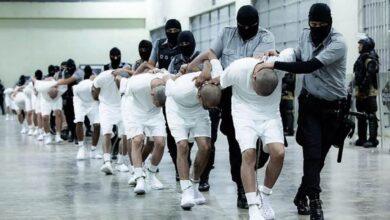It is not only Ukrainians who are fleeing from Vladimir Putin. Russians migrate due to war in Ukraine
A new migration crisis from eastern Europe is added to the list of displacements on the western part of the continent. After the Ukrainian wave, Russian migration is happening due to the War in Ukraine orchestrated by Vladimir Putin.

Photo: Kremlin.ru
LatinAmerican Post | David García Pedraza
Listen to this article
Leer en español: No solo son ucranianos los que huyen de Vladimir Putin. Rusos migran por guerra en Ucrania
The Russian offensive against Ukraine that began in February this year has maintained a 'Status Quo' until now, where only professional soldiers and volunteer fighters have stood up to government interests in Kyiv and Moscow. However, everything seems to change with the recruitment of several men by the Kremlin.
Vladimir Putin's call to summon 300,000 reservists due to a possible escalation of the conflict with neighboring Ukraine has caused thousands of families, especially men between 20 and 40 years old, to flee Russia. The majority have no intention of participating in an offensive against their own people, referring to the fact that the Russian and Ukrainian peoples have the same origin despite their nationalities.
Several analysts, such as Alex Lord, from the London strategic analysis firm Sibillyne, express that although Putin has 300,000 extra fighters in his power, the Russian military force is not capable of training all that number of men in a minimum of time. This has not stopped the Russian president in his plan to increase the number of militants.
It may interest you: Russia: Vladimir Putin and his rush to increase or end the conflict
Migration as a method of survival
Finland, Mongolia, and Georgia are the countries where more Russians have arrived in recent days to find a safe place while looking for a better destination.
Witnessing the beginning of this migratory wave, Finland's president, Sauli Niinistö, announced that by the end of the last week of September, the country will not allow entry to Russian tourists regardless of whether they have an entry visa. For its part, Mongolia has reported, according to AFP, that 3,000 Russians have entered its territory legally for less than ten days, emphasizing that 84% are men and the rest are women and children. For now, the Mongolian government has not issued a border control statement.
The maximum point of concentration of entry of Russian migrants has been seen in Armenia and Georgia, these two countries do not require a visa from Russian citizens and allow them to stay for a year without any problem in their territories. However, Georgia has been the refuge chosen by the majority of Russians due to the constant conflict that has existed between Armenia and Azerbaijan since 1988 and which has escalated as of 2020 due to the dispute over the territory of Nagorno-Karabakh.
Georgia, a country that belonged to the Soviet Union and that has two separatist territories (Abkhazia and South Ossetia), has been the most desired destination for Russian migrants, not only because of its proximity but because the government of this country has not spoken for or against the conflict between Russia and Ukraine. Despite the fact that the Georgian population is in favor of Kyiv, the Tbilisi government is cautious, since Russia recognizes the independence of the two separatist territories and keeps them under constant military protection from Moscow. The Georgian government fears that if it supports Ukraine, it will start a civil war in its nation.
Georgia's statistics office recently reported that 50,000 Russians have arrived in its country since the start of the conflict in February and 40,000 have arrived in neighboring Armenia. Traffic congestion has been so great in recent days that one of the Russian local ministries, near the border with Georgia, has urged Russian citizens not to travel to the neighboring country due to mobility difficulties at the checkpoint.
Restriction on freedom of expression and to say No!
The UN has stated that 2,400 people in Russia have been arrested for expressing themselves against the offensive against Ukraine. However, they admit that this figure could be much higher since the transparency of Russian entities is not very reliable. The region that has had the most clashes with the control forces has been Dagestan, bordering Georgia and Azerbaijan.
The spokeswoman for the UN Human Rights office, Ravina Shamdasani, has said that Russian citizens must be informed that they cannot be forced to participate in a war, since there is 'conscientious objection', an article legitimized in international human rights law. Unfortunately, very few people are aware of the existence of this clause.
Through social networks, from various parts of Russia, there have been cases where parents of young children and people who do not have a defined military status are recruited by force despite having given their refusal to belong to the reservists.
Those who say yes!
Due to the vast territory that Russia has, most of the recruited men come from the most remote eastern regions of the country, located in Siberia and the Kamchatka peninsula. This supportive position is attributed to the lack of information on the conflict.
From Chechnya, beginning with the leader of this region, Ramzan Kadirov, they approve of Russian action against Ukraine, for which the male population belonging to the Russian security forces have been urged to fight for their country, even so, Kadirov does not consider it opportune to send reservists without qualified training.
According to Mark Hertling, a former US Army general, Russian training is very poor compared to what Ukraine has thanks to international military aid. This puts a future Russian victory at risk, despite the increase in recruits.
It is possible that during the next few hours more abuses will be known due to Vladimir Putin's refusal to dialogue. Russia and its population have begun to wake up in the midst of a difficult situation for this country and an entire continent to cope with.





